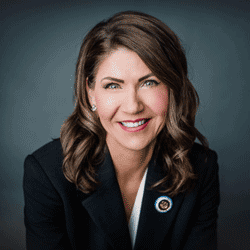

Learning from Our Mistakes
By: Governor Kristi Noem
July 16, 2021
One of the main reasons why we study history is to learn from both our triumphs and our mistakes. Sometimes those mistakes are painful to admit, but we study them nonetheless so that we can ensure that they are never repeated. That’s why students learn about the Holocaust. That’s why we study the atrocity of American slavery and the Civil War that great leaders like President Lincoln fought to end it. It’s also important that our state and our nation know about the tragic story of early Indian boarding schools.
Indian boarding schools were created in 1860 in a purported effort to assimilate Indian children into American culture. From 1860, when the Bureau of Indian Affairs (BIA) established its first Indian boarding school, throughout a majority of the 1900’s, many Indian children were forcibly removed from their homes and families and placed into these BIA schools. They were prohibited from (or punished for) speaking their language or practicing their traditions. Countless Indian children never came home, overcome by sickness and harsh conditions, and many of those who survived the boarding school experience struggled to share their traumatic memories.
The history of Indian boarding schools is not well known outside of Indian Country. However, the Tribes sharing borders with South Dakota suffered losses of their children. The accounting of children who died at these schools is inadequate at best. Mass burials, unmarked graves, and poorly kept death records haunt family histories.
In meetings with the tribes, I heard stories of heartbreak, appreciated the need for closure on this part of their history, and respected how important it was to have these children appropriately identified and returned to their homelands. I worked with the Army to help facilitate this long process of repatriating these children.
Our Tribes in South Dakota have been working diligently to retrace the steps of their lost children and will be repatriating their remains to lay them to rest in their homelands. This week, the first children will be brought home to South Dakota and to Rosebud. As I continue to be made aware of Dakota and Lakota children being repatriated, I’m happy to see those early efforts have yielded results.
It is with great sincerity that my family and I offer our thoughts and prayers to the families and to the Tribes in South Dakota as they conduct their ceremonies for those coming home, and we are with them until all their children are returned.
###

What a heartbreaking chapter in our history. We can’t forget these things or we will be doomed to repeat them. I hope that bringing them back to their families will provide some closure to a hurt that can’t be repaired. If the schools that participated in that injustice had Christian on the building. That behavior in no way represents the message of the gospel of Jesus Christ. He is the comforter of the broken-hearted and He can bring healing and forgiveness to those who have suffered from the hurt of this past injury.
Agree